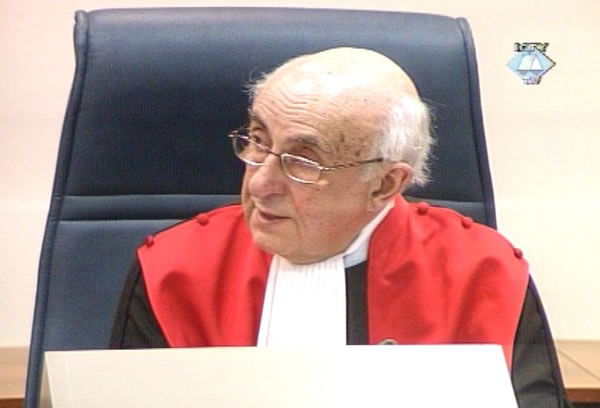Home
‘SUPERVISORY BODY’ FOR CARLA DEL PONTE
According to the amended Rules of Procedure and Evidence, a five-member Tribunal Bureau will assess whether the persons in new indictments issued by Carla del Ponte are high enough in the chain of command to warrant a trial in The Hague
 Theodor Meron, president of the Tribunal
Theodor Meron, president of the Tribunal Less than nine months before the deadline by which the Office of the Prosecutor of the War Crimes Tribunal in The Hague should complete all their current investigations and issue the last indictments, a new standard has been introduced to decide who deserves a place in an indictment issued in The Hague and who does not.
In the past ten years, the Tribunal prosecutors were completely independent in their choice of targets for their investigations and indictments. The duty of the judge, according to the Statute, was limited to determining whether, on the basis of the evidence presented to them, there is a prima facie case against the person or persons named in the indictment before them. If the criterion was met, they confirmed the indictment.
The amendments to the Rules of Procedure and Evidence, adopted at the plenary session held on 6 April 2004, introduce a new criterion and a new stage preceding the confirmation of the indictment. The new criterion is the "seniority" of the persons indicted by the prosecutor, i.e., their position on the ladder of power. In future, or rather, in the next nine months, only the indictments naming the " the most senior leaders suspected of being most responsible for crimes within the jurisdiction of the Tribunal” will be confirmed.
The actual assessment whether the indictment before them meets the standard will be taken, according to the amended Rules of Procedure, by the Bureau, composed of the president, vice-president and the three presiding judges of the three Trial Chambers. If they find that the standard has been met, they will submit the indictment to one of the judges for review and confirmation. If they find that the indictee is not senior enough to warrant a trial in The Hague, the indictment will be returned to the Office of the Prosecutor regardless of the severity of the crimes and the weight of the evidence gathered in the course of the investigation. The amendments do not specify the information and criteria that the judges from the US, Italy, Jamaica, China and Malta – currently members of the Bureau – will use to determine, prima facie, the "specific weight" of the Balkan leaders and warlords.
The press release about the amendments to the Rules indicates that the Rules have been amended in accordance with the order of the UN Security Council, which in its Resolution 1534 of 26 March 2004 called upon the Tribunal "in reviewing and confirming any new indictments, to ensure that any such indictments concentrates on the most senior leaders suspected of being most responsible for crimes within the jurisdiction of the Tribunal”.
It is interesting, however, that the letter of the French Ambassador La Sabliere, who presided over the Security Council in March this year, states that Resolution 1534 “should not be construed in a way which would have any negative impact on the independence of the two Tribunals (for the former Yugoslavia and Rwanda) and the separation of functions therein, in accordance with the relevant provisions of their Statutes and the Rules of Procedure and Evidence". The letter has been circulated as an official Security Council document.
The Office of the Prosecutor said they had "no comment" on the amendments to the Rules of Procedure and Evidence.
Linked Reports
- Case : Miscellaneous
- 2004-04-06 RECORD NUMBER OF DETAINEES IN THE HAGUE
- 2004-03-24 DEL PONTE DOES NOT HAVE JURISDICTION OVER CRIMES IN KOSOVO
- 2004-03-18 DREAMS AND REALITY OF CARLA DEL PONTE
- 2004-04-14 DEL PONTE TO SEEK "CLARIFICATIONS" FROM MERON
- 2004-04-27 GOOD ENOUGH FOR THE HAGUE, NOT GOOD ENOUGH FOR ARUSHA
- 2004-04-28 CHIEF PROSECUTOR "DOES NOT SHARE" THE VIEW OF THE TRIBUNAL'S PRESIDENT
